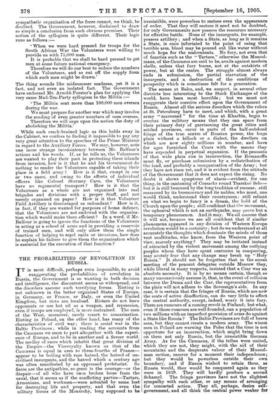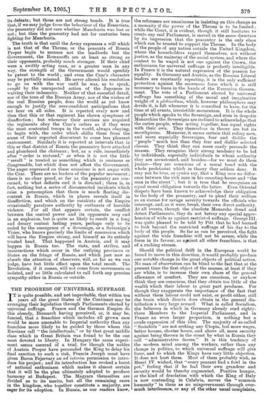THE PROBABILITIES OF REVOLUTION IN RUSSIA.
IT is most difficult, perhaps even impossible, to avoid exaggerating the probabilities of revolution in Russia, the Government is so wanting in both decision and intelligence, the discontent seems so widespread, and the disorders assume such terrifying forms. Rioting is not unknown in the better organised States of Europe, in Germany, or France, or Italy, or even the United Kingdom, but riots are localised. Rioters do not burn opponents or use hot oil as a weapon, and repression, even if troops are employed, is more restrained. The men of the West, moreover, rarely resort to assassination. Rioting in Poland, on the other hand, has many of the characteristics of civil war ; there is social war in the Baltic Provinces ; while in reading the accounts from the Caucasus we seem to part altogether with the experi- ence of Europe, and to be in another and a fiercer world. The medley of races which inhabit that great division of the Empire—the Viceroyalty known as that of the Caucasus is equal in area to three-fourths of France— appear to be boiling with race hatred, the hatred of un- civilised insurgents, and the hatred which a century ago was often manifested by an oppressed proletariat. So fierce are the antipathies, so great is the courage—or the despair—of all who have once broken loose from the usual, that it seems as if the conflicting parties—Tartars, Armenians, and workmen—were actuated by some lust for destroying life and property, and that even the unitary forces of the Monarchy, long supposed to be irresistible, were powerless to restore even the appearance of order. That they will restore it need not be doubted, for only Governments now possess the resources necessary for effective battle. None of the insurgents, for example, possess artillery ; and when a State, as long as it remains a State, is once infuriated to the point of using that terrible arm, blood may be poured out like water without much hope for the malcontents. No fury, not even that of fanatics such as the " Tartars," otherwise the Mussul- mans, of the Caucasus are said to be, avails against modern shells, unless that fury burns, not at the outskirts of power, but at the centre. The struggle almost always ends in submission, the partial starvation of the insurgents, and a destruction of the conditions of prosperity which is sometimes felt for a generation.
The scenes at Balm, and, we suspect, in several other districts less interesting to the Stock Exchanges of the world, have been most horrible ; but we must not exaggerate their coercive effect upon the Government of Russia. Almost all the serious disorders which the rulers at St. Petersburg have to meet, and which, with a great army " marooned " for the time at Kharbin, begin to overtax the military means that they can spare from their primary duty of garrisoning the great cities and settled provinces, occur in parts of the half-subdued fringe of the true centre of Russian power, the huge plain without a hillock or a dialect, the dwellers on which are now eighty millions in number, and have for ages furnished the Czars with the means they have expended in perpetual expansion. If the peasants of that wide plain rise in insurrection, the Romanoffs must fly, or purchase submission by a redistribution of the land, and probably a reorganisation of the Army ; but they have not risen yet, and it is evident from the attitude of the Government that it does not expect the rising. No doubt it shows symptoms of alarm—evident, for one thing, in the cantoning of Cossacks round Tsarska Selo— but it is still bemused by the long tradition of success; still reassured by its bureaucracy and its nobles, who must, one would think, understand their countrymen; still reliant on what we begin to fancy is a dream, the hold of the Church upon the people ; still confident that the movement, the upheaval which is not an earthquake, may prove but a temporary phenomenon. And/it may. We all assume that it will not, because we are all confident that if similar phenomena appeared in any division of Western Europe revolution would be a certainty; but do we understand at all accurately the thoughts which dominate the minds of those vast multitudes, who know, from the Western point of view, scarcely anything ? They may be irritated instead of attracted by the violent movement among the outlying peoples whom they have spent centuries in conquering, may acutely fear that any change may break up " Holy Russia." It should not be forgotten that in the secret meeting of the peasant delegates outside Moscow they, while liberal in many respects, insisted that a Czar was an absolute necessity. It is by no means certain, though so many unconsciously assume it, that, in the event of collision between the Puma and the Czar, the representatives from the plain will not adhere to the Sovereign's side. In any case, it is certain that the fringes of Russia, which are now the seats of active disaffection, can do very little to affect the central authority, except, indeed, worry it into fury. There are rumours of a coming revolt in Finland; but what, even if those rumours are well founded, can a population of two millions with an imperfect provision of arms do against a State like Russia ? The Baltic Provinces are full of brave men, but they cannot create a modern army. The wisest men in Poland are warning the Poles that the time is not opportune for an insurrection, which might bring down on them not only Russia, but the irresistible German Army. As for the Caucasus, if the tribes were united, which they are not, they might, with the aid of their mountains and the desperate valour of their Mussul- man section, recover for a moment their independence; but they would be powerless outside their own boundary, and if Russia wished to retain them, as Russia would, they would be conquered again as they were in 1839. They will hardly produce a second Schamyl. The fringe provinces have not the slightest sympathy with each other, or any means of arranging for concerted action. They all, perhaps, desire self- government, and all think the central power weaker for its defeats ; but those are not strong bonds. It is true that, if we may judge from the behaviour of the Reservists, the peasantry did not care whether Manchuria was lost or not ; but then the peasantry had not for centuries been fighting for Manchuria.
The truth is that until the Army expresses a will which is not that of the Throne, or the peasants of Russia Proper begin to menace not the landlords but the. Government, the Romanoffs are at least as strong as their opponents, probably much stronger. If their chief were a swiftly acting man, or a greater man in any way, the strength of the Government would speedily be patent to the world ; and even the Czar's character may be partially misread. He never altered his resolution to go on with the war until he was, so to speak, caught by the unexpected action of the Japanese in waiving their indemnity. Neither of that essential detail, nor of the tone of the Russian Army, nor of the wishes of the real Russian people, does the world as yet know enough to justify the over-confident anticipations that we hear on all sides. It is reported every now and then that this or that regiment has shown symptoms of disaffection ; but whenever their services are required the regiments obey the Czar's orders as if they were the most contented troops in the world, always obeying, to begin with, the order which shifts them from the scene of their reported discontent to some less pleasant cantonment. Similarly it is reported at intervals that in this or that district of Russia the peasantry have attacked and plundered the châteaux ; but, as a rule, immediately after " order is restored," or when it is not the little " revolt " is treated as something which is ominous or disagreeable, but which does not affect the Government. The anger expressed on these occasions is not anger with the Czar. There are no leaders of the popular movement ; there is no clear proof, so far as the peasantry are con- cerned, to what definite end it is directed ; there is, in fact, nothing but a series of disconnected incidents which raise a presumption that there is much floating dis- content in Russia, which in places reveals itself in disaffection, and which on the outskirts of the Empire occasionally paralyses authority by outbursts of horrible violence. For all that appears certain, the conflict between the central power and its opponents may end in an explosion, but is quite as likely to result in a long and dreary contest lasting years, perhaps only to be ended by the emergence of a Sovereign, or a Sovereign's Vizier, who knows precisely the limits of concession which will leave the Empire strong, and himself as its entirely trusted head. That happened in Austria, and it may happen in Russia too. The riots, and strikes, and insurrections which occur in the outlying provinces or States on the fringe of Russia, and which just now so absorb the attention of observers, will, so far as we can judge, have but little effect upon the total result. The Revolution, if it comes, will not come from movements so isolated, and so little calculated to call forth any genuine sympathy either in Russia or outside.











































 Previous page
Previous page